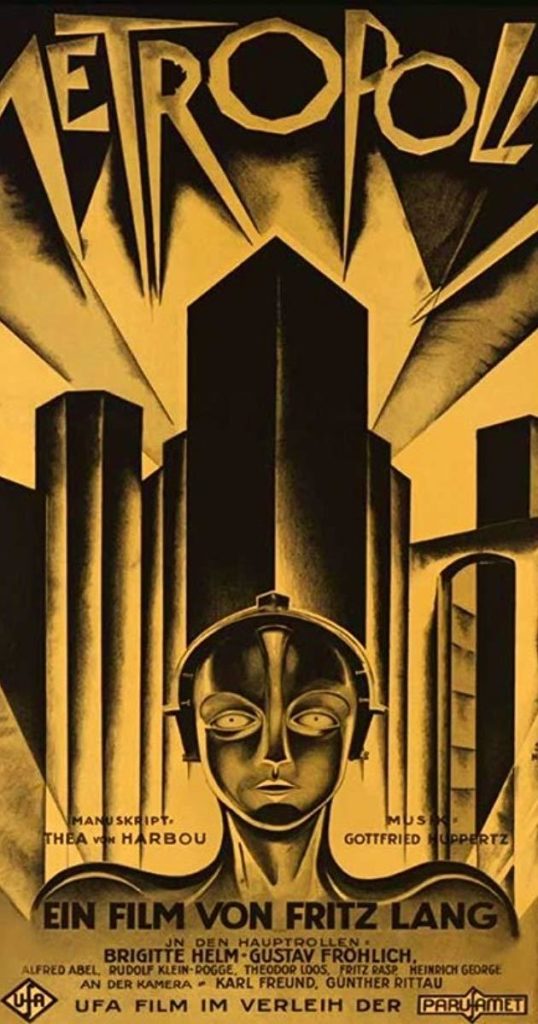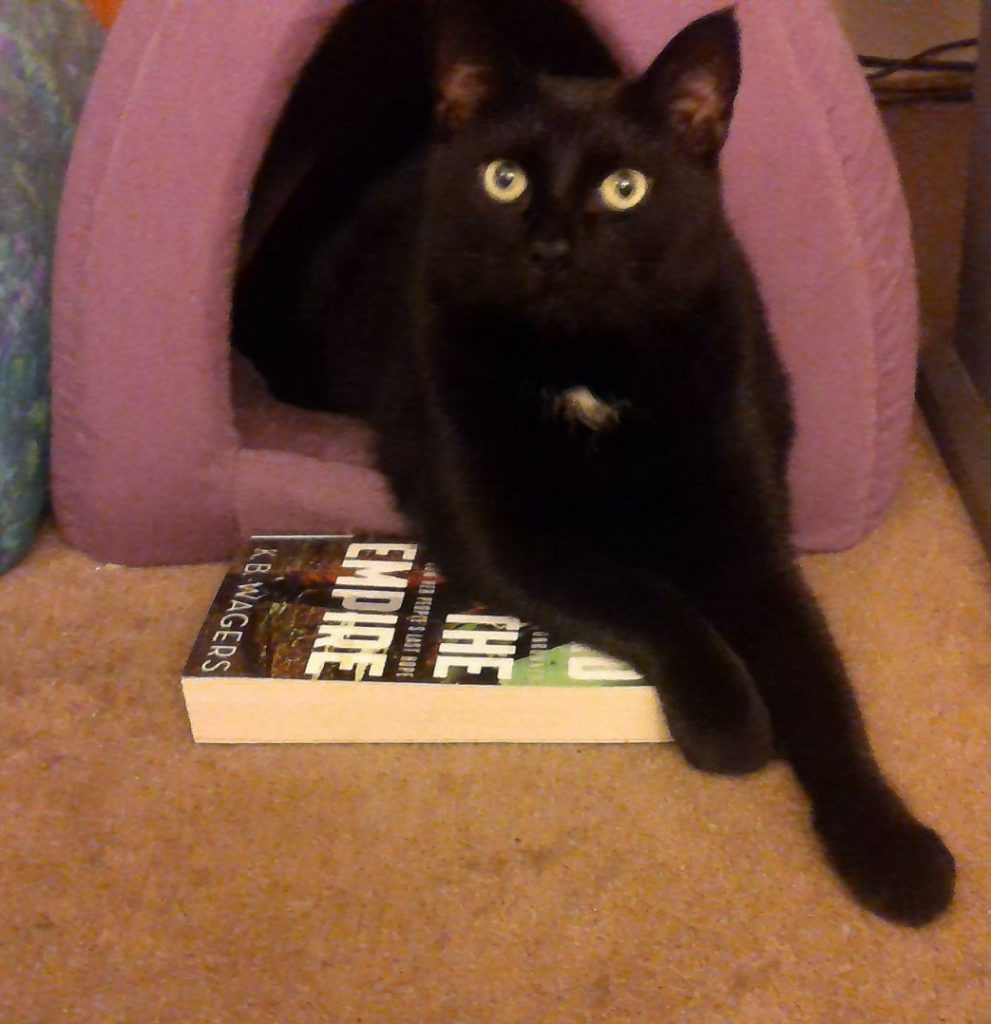(1) 2021 FAAN VOTING DEADLINE. FAAn Awards Administrator Nic Farey reminds everyone that today is the last day of voting – it closes tonight — March 12 — at midnight Pacific time. Guidelines and the ballot are available in The Incompleat Register 2020 [PDF file]
(2) SOLVING FOR PIE. Scott Edelman invites listeners to “Grab a slice of pie with Gil Roth” on Episode 140 of his Eating the Fantastic podcast.

I’ve been wanting to bring Gil to you for awhile, and had been hoping we’d be able to sneak away for a meal during either Readercon or the Small Press Expo, but neither occurred last year, at least not outside of a virtual space, and both will be virtual again this year. So as you listen, I’d like you to think of yourself as being with us at one of those cons, and tagging along as we head off to chat and chew.
We discussed his surprising (and my unsurprising ) guest with the greatest number of downloads, the advice John Crowley gave him about his potential writing career, how a guy who used to memorize X-Men comics got turned on to Love & Rockets, the way we process the deaths of former guests, the song he wants played at his memorial service, how to get often-interviewed guests not to regurgitate their favorite soundbites, why no comic book movie beats the first Superman, how he became the publisher of every letter Samuel R. Delany wrote in 1984, why during his days reviewing for The Comics Journal readers thought he was the secret identity of another writer, the Italo Calvino quote which has kept him going through the pandemic, and much more.
(3) YOUR IMAGINARY FRIENDS WHO WANT A PERCENTAGE. Victoria Strauss posted another Scam Alert at Writer Beware: “Paper Bytes Marketing Solutions and its Stable of Imaginary Agents”.
…To go with its brand-new name, Paper Bytes has initiated a brand new scam: a stable of imaginary literary agents. It’s an unusually detailed endeavor, with actual websites for each agent (albeit not very good ones) that include photos–some stock, some stolen–as well as made-up bios and false claims about who/what they represent. All share the email address @bookliteraryagent.com, which no doubt is convenient for the interchangeable roster of Paper Bytes marketers who inhabit these agent personas, but also makes them easier to track and expose.
I’ll list them all below. But first, How It All Works!…
…How to protect yourself?
1. Know how things work in the publishing world. Real literary agents don’t sell services to potential clients, or refer them to companies that do. Real agents don’t commonly contact writers out of the blue. The warnings at the Writer Beware website can help you recognize non-standard or predatory practices.
(4) ZIGGY STARDUST’S BROTHER BIGGY? Mental Floss recalls when “David Bowie Tried to Turn George Orwell’s ‘1984’ Into a Musical”.
The track list for David Bowie’s 1974 album Diamond Dogs offers a couple obvious clues about one source of inspiration: song titles include both “1984” and “Big Brother.” But Bowie didn’t just want to use themes from George Orwell’s 1984 on the record. As Open Culture reports, he initially hoped to turn the 1949 dystopian classic into a full-fledged musical of its own.
https://www.youtube.com/embed/x2xfpMMQIJ8 What form that musical was ultimately meant to take isn’t totally clear. According to Christopher Sandford’s biography Bowie: Loving the Alien, the adaptation would’ve been “a West End musical, with an accompanying album and film.” But in a Rolling Stone interview with William S. Burroughs from February 1974—just months before the release of Diamond Dogs—Bowie himself mentioned he was “doing Orwell’s 1984 on television.” It’s possible the project went through several iterations when the “Space Oddity” singer was still brainstorming it. But thanks to Orwell’s widow, Sonia (believed to be the basis for 1984‘s Julia), the musical never progressed past the incubation stage.
“My office approached Mrs. Orwell, because I said, ‘Office, I want to do 1984 as a musical, go get me the rights,’” Bowie explained in 1993, according to David Buckley’s Strange Fascination: David Bowie, the Definitive Story. “And they duly trooped off to see Mrs. Orwell, who in so many words said, ‘You’ve got to be out of your gourd, do you think I’m turning this over to that as a musical?’ So, they came back and said, ‘Sorry, David, you can’t write it.’” Since Bowie had already started “putting bits of it down” in the studio, the surprise rejection forced him to pivot quickly. His ill-fated musical became a concept album with Orwellian overtones.
(5) IT’S NEWS TO SOMEBODY. The publication of Matthew Yglesias’ article “Oh, the intellectual property rights you’ll extend” at Slow Boring has caught up with the already-played-out week-old Twitterstorm. Nevertheless, at the link you can read him make a case about copyright law, triggered by the Dr. Seuss controversy.
…Regardless, under U.S. law, the copyrights last for the duration of their creator’s life plus 70 years — i.e., until 2061.
That’s a big change from how we did things in the Founders’ era, when copyrights lasted 14 years with an option to renew the copyright for an additional 14 years.
Since then, not only has Congress repeatedly extended the duration of copyright terms, they’ve even extended them retroactively, basically preventing Mickey Mouse (created in 1928) or Superman (created in 1938) from ever entering the public domain the way that 19th century characters like Frankenstein1 or Sherlock Holmes have.
I bring this all up because I think it’s relevant policy context for the recent controversy over Seuss Enterprises withdrawing six books from publication that were deemed problematic. Right-wing agitators have responded to this as if it’s the government censoring Dr. Seuss, and so out of solidarity with Dr. Seuss, they are buying non-canceled classics like “Green Eggs and Ham” in droves. But this is just not factual. Dr. Seuss has been dead for nearly 30 years. His heirs — likely these two stepdaughters, though that’s not entirely clear — canceled the books, and now are the ones reaping the financial rewards from the backlash to their own actions….
(6) BEHIND WANDAVISION. Marvel Entertainment dropped a trailer for “Marvel Studios’ Assembled: The Making of WandaVision”, a behind the scenes look at the series.
(7) MORE BINDING. The Verge reports on a trend toward “Making fanfiction beautiful enough for a bookshelf”.
… Lesure spends hours making sure each book looks unique and regal, but she has to be careful not to use any specific imagery that could land her in trouble.
That’s because the books Lesure crafts contain works of fanfiction, and she’s found an entire community of avid readers looking to turn their unauthorized digital favorites into physical treats.
Nothing about the process is simple. There are “literally hundreds of moments where I could do something wrong and everything falls to shambles,” Lesure, a student who started bookbinding during a gap year in 2019, told The Verge. Her process includes typesetting, redoing the typesetting, doing that again and again until it’s right, printing, folding, sewing, making the cover, and finally putting it all together.
Fanfiction has traditionally been confined to online sites like Archive of Our Own (AO3) and FanFiction.Net, but some of the most prolific artists within the space have found a way to help people enjoy their favorite titles in new ways: binding the stories into physical novels designed to read better and stand out on bookshelves. The crafts have helped bring some of the most popular unofficial stories set in Harry Potter, Star Wars, and other universes onto shelves where they can sit right alongside their authorized counterparts.
(8) OUR BRIGHT FUTURE. The New York Times takes stock of the city’s inescapable barrage of LED sign advertising: “Am I in Manhattan? Or Another Sequel to ‘Blade Runner’?”
…Adrian Benepe, the former New York City Parks Commissioner and current head of the Brooklyn Botanic Garden, sees “creeping Blade Runner syndrome” everywhere, from the clogged skies over Manhattan to the subways, which he rides to work every day from his home on the Upper West Side.
“They’re empty,” Mr. Benepe said. “I’ve been alone many times at rush hour. It’s eerie as hell.” He also finds the movie prescient in its depiction of a world saturated by intrusive, omnipresent advertising.
“Places in New York that used to not have advertising now have ads,” he said. “You can’t get away from it. It’s in the subways, it’s on the streets, it’s on barges. You never stop being assailed.”
Giant screens are nothing new, of course. But New York’s streetscape had been permeated as never before with twitchy, adhesively catchy LEDs, a trend that has only accelerated during the pandemic, with the Metropolitan Transportation Authority announcing last summer the addition of 9,000 screens broadcasting “Covid-relevant safety information.”
(9) MEDIA BIRTHDAY.
- March 12, 1927 –On this day in 1927, Metropolis premiered in Germany. It was directed by Fritz Lang. It was written by Thea von Harbou in collaboration with Lang. It stars Gustav Fröhlich, Alfred Abel, Rudolf Klein-Rogge and Brigitte Helm. The film’s message is encapsulated in the final inter-title of “The Mediator Between the Head and the Hands Must Be the Heart.” In 2001 the film was placed upon UNESCO’s Memory of the World Register, the first film so distinguished. It is considered one of the greatest films ever made, and has a 92% rating among audience members at Rotten Tomatoes.

(10) TODAY’S BIRTHDAYS.
[Compiled by Cat Eldridge and John Hertz.]
- March 12, 1879 — Alfred Abel. His best-known performance was as Joh Fredersen in Fritz Lang’s Metropolis. It wasn’t his only genre as Phantom, a 1922 German film, was fantasy, and my German is just good enough for years I studied it to see how much of work could be considered genre or genre adjacent. (Died 1937.) (CE)
- March 12, 1886 — Kay Nielsen. Though he’s best known for his work with Disney for whom he did many story sketches and illustrations, not least for Fantasia and The Little Mermaid be it thirty years after his death, I’d be remiss not to note his early work illustrating such works as East of the Sun and West of the Moon, Hansel and Gretel and Andersen’s Fairy Tales. (Died 1957.) (CE)
- Born March 12, 1911 – Edmund North. Major in the U.S. Army Signal Corps during World War II. Served a term as President of the screen branch of the Writers Guild of America. A score of movies; co-winner of the Best Screenplay Oscar for Patton; for us, screenplay for The Day the Earth Stood Still – which, despite its staggering difference from Bates’ “Farewell to the Master”, I think a classic. Coined Klaatu barada nikto. (Died 1990) [JH]
- March 12, 1914 — John Symonds. Critic of Alistair Crowley who published four, yes four, books on him over a fifty year period starting in the Fifties: The Great Beast, The Magic of Aleister Crowley, The King of the Shadow Realm and The Beast 666. Needless to say the advocates of Crowley aren’t at all happy with him. Lest I leave you with the impression that his only connection to our community, he was a writer of fantasy literature for children including the feline magical fantasy, Isle of Cats with illustrations by Gerard Hoffnung. (Died 2006.) (CE)
- Born March 12, 1916 – Richard Dorson, Ph.D. Pioneering and possibly great folklorist – thus our neighbor; pioneering because, in his day, commercial and even arguably artistic success of retellings like Davy Crockett and inventions like Paul Bunyan were clouding the mind. Coined urban legend and fakelore. General editor, Folktales of the World. Two dozen books, including a 1939 one on Crockett; Folk Legends of Japan; African Folklore. “Suspicious of attempts by other disciplines –anthropology, sociology, and psychology, among others – to co-opt folk culture for their own … purposes…. emphasized the necessity for the accurate collection and documentation of folk materials” (quoted from this). (Died 1981) [JH]
- March 12, 1925 — Harry Harrison. Best known first I’d say for his Stainless Steel Rat and Bill, the Galactic Hero series which were just plain fun, plus his novel Make Room! Make Room! which was the genesis of Soylent Green. I just realized I’ve never read the Deathworld series. So how are these? See OGH’s post on the Alex Cox animated version of Bill, the Galactic Hero here. (Died 2012.) (CE)
- March 12, 1933 — Barbara Feldon, 88. Agent 99 on the Get Smart series. Other genre credits include The Man from U.N.C.L.E. and reprising her character on the short-lived follow-up to this series, Get Smart, done twenty years later. She didn’t have that much of an acting career though she did show up in the pilot of Rowan & Martin’s Laugh-In. (CE)
- Born March 12, 1936 – Virginia Hamilton. National Book Award, Newbery Medal (first black to win it), Hans Andersen Award, Wilder Award. Amer. Lib’y Ass’n King-Hamilton Award named for her (and Coretta Scott King). Eight novels (including Willie Bea and the Time the Martians Landed), thirty shorter stories, four collections for us; twoscore books all told. (Died 2002) [JH]
- March 12, 1952 — Julius Carry. His one truly great genre role was as the bounty hunter Lord Bowler in The Adventures of Brisco County, Jr. – oh, but what a role it was! Over the course of the series, he was the perfect companion and foil to Bruce Campbell’s Brisco County, Jr. character. He did have one-offs in The Misfits of Science, Earth 2, Tales from the Crypt and voiced a character on Henson’s Dinosaurs. (Died 2008.) (CE)
- Born March 12, 1955 – Jim Mann, F.N., age 66. Living in Pittsburgh, hard-working member of NESFA (New England SF Ass’n) for whose NESFA Press he has edited a dozen books including The Compleat Boucher and The Rediscovery of Man (Cordwainer Smith). Chaired Boskone 25 (with wife Laurie Mann) and 47. Fan Guest of Honor (with LM), ArmadilloCon 27. Fellow of NESFA (service award). [JH]
- Born March 12, 1963 – David B. Coe, Ph.D., age 58. A score of novels, as many shorter stories (some under another name). Crawford Award for LobTyn Chronicle (trilogy). Reviews and Robots called Time’s Children Best Fantasy Novel of 2018. Interviewed in Strange Horizons, Teleport. “We … construct our worlds twice…. for ourselves [and] again … digestible and entertaining and unobtrusive, not to mention elegant, poetic, even exciting…. all the necessary material – and not an ounce more…. [after we] have unraveled their mysteries … decided which elements … are most important to our stories.” [JH]
- Born March 12, 1971 – Rob St. Martin, age 50. Six novels, one novelette, anthology Ages of Wonder (with Julie Cznerneda). Has read Pride and Prejudice, The Phantom Tollbooth, A Tale of Two Cities, Moby-Dick, Romeo and Juliet, Curious George. [JH]
(11) COMICS SECTION.
- Frank and Ernest discuss Captain Hook’s diet plan.
(12) GUARDIAN ANGLE. Lisa Tuttle has a new installment of “The best recent science fiction and fantasy – reviews roundup” at The Guardian in which she reviews Skyward Inn by Aliya Whiteley; Birds of Paradise by Oliver K Langmead; The Echo Wife by Sarah Gailey; A History of What Comes Next by Sylvain Neuvel; and A Desolation Called Peace by Arkady Martine.
(13) GEARING UP. I’m always ready to read more about the Antikythera mechanism: “Scientists may have solved ancient mystery of ‘first computer’” in The Guardian.
…The battered fragments of corroded brass were barely noticed at first, but decades of scholarly work have revealed the object to be a masterpiece of mechanical engineering. Originally encased in a wooden box one foot tall, the mechanism was covered in inscriptions – a built-in user’s manual – and contained more than 30 bronze gearwheels connected to dials and pointers. Turn the handle and the heavens, as known to the Greeks, swung into motion.
Michael Wright, a former curator of mechanical engineering at the Science Museum in London, pieced together much of how the mechanism operated and built a working replica, but researchers have never had a complete understanding of how the device functioned. Their efforts have not been helped by the remnants surviving in 82 separate fragments, making the task of rebuilding it equivalent to solving a battered 3D puzzle that has most of its pieces missing.
Writing in the journal Scientific Reports, the UCL team describe how they drew on the work of Wright and others, and used inscriptions on the mechanism and a mathematical method described by the ancient Greek philosopher Parmenides, to work out new gear arrangements that would move the planets and other bodies in the correct way. The solution allows nearly all of the mechanism’s gearwheels to fit within a space only 25mm deep….
(14) ROCKET’S RED GLARE. “Green Run Update: NASA Targets March 18 for SLS Hot Fire Test – Artemis”.
NASA is targeting Thursday, March 18 for the second hot fire of the Space Launch System (SLS) rocket’s core stage at NASA’s Stennis Space Center near Bay St. Louis, Mississippi.
After performing tests to demonstrate that a recently repaired liquid oxygen pre-valve was working, the team has continued to prepare the core stage, its four RS-25 engines, and the B-2 test stand for the second hot fire at Stennis. Later this week, the team will power up the core stage again and do a final check of all its systems. Then, on March 16, two days before the test, they will power up the stage, starting the clock for the second hot fire….
(15) YOU ARE NUMBER SIX. Paul Weimer meets the challenge of reviewing the sixth book in a series: “Microreview [book]: Out Past the Stars by KB Wagers” at Nerds of a Feather.
… This is in many ways a very different book than the previous book, Down Among the Dead. Reading it in quick succession after the second book might give some emotional whiplash, it certainly is a gear shift. It’s much more like the first book of the Farian War trilogy, There Before the Chaos, in the sense that it builds up to a big set piece finale of a conflict. Unlike that first book, though, this book is much more about the action beats.
This shows the range and power of the author across the three books, and sets them apart from the first trilogy as well, which is more adrenaline filled….
(16) TIGER TIGER. Elsewhere at Nerds of a Feather, Sean D assesses a novella by Aliette de Bodard: “Microreview [Book]: Fireheart Tiger by Aliette de Bodard”.
…This novella constantly shifts from plot point to plot point, that kept me on my toes without unmooring me into confusion. The craft involved with implementing poetic language that benefits the atmosphere, pacey scenes that never lose focus, and characters that I felt like I knew inside out by the story’s conclusion, deserves kudos. Mostly because the novella juggles a small, insulated cast of characters with subterfuges and violence that impact other kingdoms. Fireheart Tiger is like an expansive web that leaves the reader in the center of it, while also skillfully and pithily letting them know of all its disparate parts.
(17) ELDRITCH SCIENCE. The Late Show with Stephen Colbert couples an alarming report with a Cthulhu reference. “Quarantinewhile… Please Stop Reviving Ancient Pathogens From The Sea Floor”.
Quarantinewhile… In “Hey, maybe don’t do that” news, Japanese scientists are experimenting on 100-million-year-old bacteria that wake up from their slumber when brought to the surface and provided with food.
(18) PIPING AT THE GATES OF DAWN. And speaking of Lovecraft –
[Thanks To John King Tarpinian, Mike Kennedy, rcade, Nic Farey, Andrew Porter, Martin Morse Wooster, Michel Toman, JJ, Cat Eldridge, Rob Thornton, and John Hertz for some of these stories. Title credit belongs to File 770 contributing editor of the day Anna Nimmhaus.]












